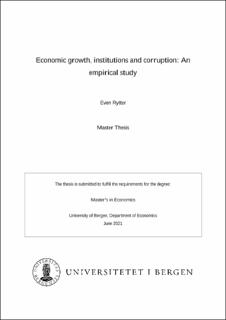| dc.description.abstract | This paper seeks to explore why differences in economic growth occur across countries. Firstly, two models of economic growth are reviewed: the Solow model and the Romer model. The Solow model predicts a convergence in economic growth rates between countries, while the Romer model predicts that rich countries with a large stock of technological know-how will experience a higher growth in technology, and therefore achieve faster economic growth than poor countries. Secondly, following the literature, a growth accounting exercise is undertaken to decompose the growth rate of GDP per capita into three constituent terms: growth rate of capital-output ratio, growth rate of human capital per capita and growth rate of total factor productivity (TFP). From the derived expression, two estimating models are formulated: one for the growth rate of GDP per capita and one for the growth rate of TFP. Thirdly, institutions and corruption are discussed in light of the economic models and how they enter the proposed models. The paper employs fixed effects estimation, using a cross-country panel dataset consisting of 170 countries over a time period of 17 years, from 2002 to 2019. The results suggest that corruption has a negative effect on the growth rates of both real GDP per capita and TFP. This effect seems to be larger in poorer and more corrupt countries. Further, the results give evidence in favor of the hypothesis that corruption has beneficial effects on the growth rate of TFP in Southeast Asian countries. Three different software programs have been used in this study. Python and Microsoft Excel have been used to sort out and organize the dataset. Stata was used for estimating purposes. | |
